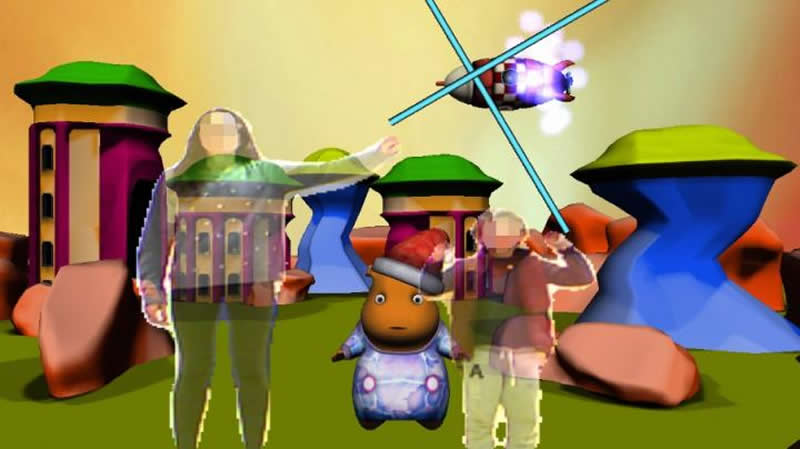Summary: A new video game fosters more social initiation that free play for those with ASD. The game also is effective at reducing repetitive behaviors and helps improve gestural expression.
Source: UPF Barcelona
Narcís Parés, a member of the Cognitive Media Technologies research group of the Department of Information and Communication Technologies (DTIC) at UPF, is working on a research line known as “full-body interaction”. At his laboratory, he designs different applications based on such interaction in order to study the mediation of experiences. In conjunction with Hospital Sant Joan de Déu, he created Pico’s Adventure, a videogame based on full-body interaction that encourages social communication among participants.
The videogame seeks to facilitate the social interaction of children with autism by means of a series of fun, collaborative experiences. As Parés explains, “the first experimental studies proved effective as a complement to conventional therapies”. “Since then, Pico’s Adventure has become an important benchmark in the search for ICT-based tools to promote social interaction conduct in children with ASD”.
In a recent study, published in the advanced online edition of Research in Autism Spectrum Disorders, a group of 15 four to six-year-olds diagnosed with ASD participated in four sessions in which they played with the Pico’s Adventure video game and with other types of game. The research was led by Narcís Parés in collaboration with researchers from Hospital de Sant Joan de Déu and Mutua Terrassa, who have studied the participants’ behaviour according to an observational scale.

This observational research sought to study social initiation conducts using a full-body interaction videogame compared to the number of social interaction conducts occurring during a free-play activity in children with ASD. “In this case, we refer by free-play to playing with toys (push-chairs, dolls, balls, etc.), alone or with a partner, without any guidance or rules”, Parés explains. The authors posited that the videogame could elicit a higher number of social conducts and, therefore, this technology could be proposed as a tool to promote social initiation skills.
The videogame has also proved to be more effective at reducing repetitive conducts and improve the children’s gestural expression.
The results have shown that the videogame fosters more social initiation than free-play, in children with ASD when they played alone or in pairs. Moreover, when the child played with its parents, the videogame proved to be as effective as free-play in promoting social initiation. The videogame has also proved to be more effective at reducing repetitive conducts and improve the children’s gestural expression. Videogames could be considered as being a suitable tool to foster social behaviour as well as being useful as a complement to traditional treatments, but “future work is needed in order to obtain further data that support this hypothesis”, the researcher add.
Source:
UPF Barcelona
Media Contacts:
Núria Pérez – UPF Barcelona
Image Source:
The image is credited to UPF.
Original Research: Closed access
“A full-body interactive videogame used as a tool to foster social initiation conducts in children with Autism Spectrum Disorders”. Narcís Parés et al.
Research in Autism Spectrum Disorders doi:10.1016/j.rasd.2019.101438.
Abstract
A full-body interactive videogame used as a tool to foster social initiation conducts in children with Autism Spectrum Disorders
Background
Game-based interventions that involve the use of technology have shown to facilitate motivation and learning processes in children with Autism Spectrum Disorders (ASD). The purpose of this observational study project was to conduct a feasibility study to compare the amount of social initiation conducts performed during a full-body interaction videogame versus the amount of social initiation conducts occurred during a free-play activity in children with ASD. We hypothesized that the videogame could elicit a higher number of these conducts and therefore could be proposed as a tool to promote social initiation skills.
Method
A total of 15 children (ages 4–6) participated in four sessions with two sections: playing with the videogame Pico’s Adventure and free play time. Social skills conducts were codified according to an observational scale.
Results
Results show that the videogame elicited more social initiation conducts than free play in children with ASD when they were playing alone or playing with a peer. Furthermore, it showed to be as effective as free play in promoting social initiation while playing with parents. The videogame was also effective in reducing repetitive behaviors and increasing gestures.
Conclusions
Considering all these results, the videogame could be considered as an appropriate tool to foster social behaviors but future work is needed in order to obtain further data that supports this hypothesis. Finding new attractive types of treatment would be useful to complement more traditional therapies.






